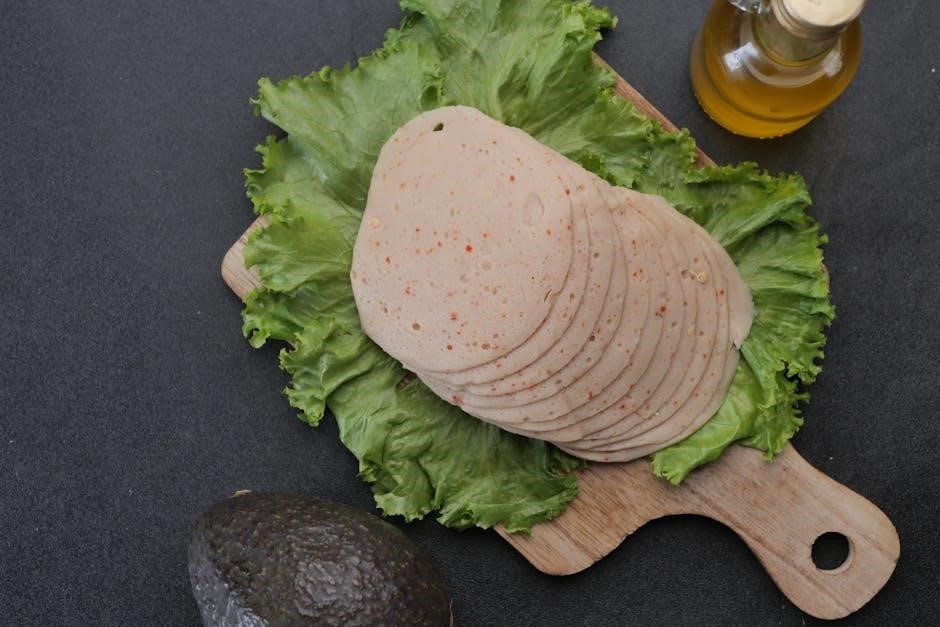What is a Protein Diet Plan?
A protein diet plan emphasizes protein intake, often aiming for 1.2 to 2 grams per kilogram of body weight daily. This approach supports muscle preservation, satiety, and weight management. The diet typically involves lean meats and plant based protein sources.
Benefits of a High-Protein Diet
High-protein diets offer several advantages, including increased satiety, which helps in weight loss, and enhanced muscle preservation, particularly during calorie deficits. They also contribute to overall metabolic health and body composition improvements and more gut health.
Weight Loss and Satiety
High-protein diets are effective for weight loss due to increased satiety. Protein promotes feelings of fullness, reducing overall calorie intake. Studies demonstrate that high-protein diets can help people feel full, which safely reduces caloric intake. Combining protein with fiber further enhances satiety and promotes healthy gut bacteria, reducing bloating. Protein-rich snacks, such as Greek yogurt with berries or protein shakes, can prevent overeating by keeping hunger at bay. A 2017 study also showed Mediterranean diets with activity are effective.
Muscle Preservation and Building
Protein is essential for muscle preservation and building, especially during weight loss or strength-training programs. Adequate protein intake ensures the body maintains muscle mass while reducing fat. A diet with 150 grams of protein daily is often recommended to retain muscle mass. Protein is present in every cell and plays a crucial role in cell repair, supporting healthy muscles. Combining a high-protein diet with resistance exercise optimizes muscle growth and strength gains. Including protein at each meal is important.
Other Health Benefits
Beyond weight management and muscle support, high-protein diets offer additional health benefits. Protein plays a role in bone health, skin health, and immune function. Adequate protein intake supports cell repair and overall body maintenance. Some studies suggest high-protein diets can improve blood sugar control and reduce the risk of certain chronic diseases. Protein contributes to various bodily functions. Incorporating diverse protein sources ensures a well-rounded nutrient profile. A high-protein diet must include a varied diet for adequate nutritional intake to achieve optimal wellness.

How Much Protein Do You Need?
Protein needs vary. Generally, aim for 1.2 to 2 grams per kilogram of body weight daily. Individual requirements depend on activity level, age, and health goals. Consulting a dietitian provides personalized guidance for optimal protein intake.
General Recommendations
General protein recommendations typically fall between 1.2 and 2.0 grams of protein per kilogram of body weight each day for most adults following a high-protein diet. This range can support muscle maintenance, satiety, and overall health goals. For example, a person weighing 70 kilograms might aim for 84 to 140 grams of protein daily. Distributing protein intake evenly across meals can further optimize these benefits. Individual requirements may vary based on factors such as activity level and specific health considerations, so consulting with a registered dietitian is recommended for personalized advice.
Factors Affecting Protein Needs
Several factors influence individual protein needs. Activity level is a key determinant, with athletes and highly active individuals requiring more protein to support muscle repair and growth. Age also plays a role; older adults often need increased protein to combat age-related muscle loss. Body weight and composition are important considerations, as heavier individuals or those with more muscle mass generally require more protein. Health conditions, such as kidney disease, may necessitate adjustments to protein intake. Finally, pregnancy and breastfeeding increase protein demands to support fetal development and milk production, respectively.

Sample 7-Day High-Protein Meal Plan
A sample plan offers a structured approach to increasing protein. It includes diverse meals and snacks, ensuring adequate protein intake. This can guide individuals in creating their own personalized high-protein meal plans and achieve their health goals.
Breakfast Ideas
Start your day with protein-packed options like eggs, Greek yogurt, or protein shakes. Scrambled eggs with turkey bacon provide a savory start, while Greek yogurt with berries offers a sweet and nutritious alternative. A protein smoothie, blending whey protein, Greek yogurt, banana, and milk, is a quick and convenient choice. These choices contribute to meeting daily protein goals while supporting satiety and energy levels, helping to maintain a balanced and effective high-protein diet.
Lunch Ideas
For a protein-rich lunch, consider options like grilled chicken salad, tuna salad on whole-grain bread, or a hearty lentil soup. A quinoa bowl with chickpeas, tofu, and avocado provides plant-based protein and healthy fats. Leftovers from dinner, such as super-green tofu curry, can also make a convenient and nutritious lunch. These options provide sustained energy and help meet your daily protein goals, supporting muscle maintenance and satiety throughout the afternoon.
Dinner Ideas
Dinner options for a protein-focused diet can include baked salmon with roasted vegetables, lean ground turkey stir-fry, or grilled chicken breast with a side of quinoa. A hearty chili with beans and lean beef offers both protein and fiber. Consider herby fish fingers with Chinese-style rice or tuna & sweetcorn fish cakes. These meals provide a substantial protein boost to support muscle repair and growth while keeping you feeling full and satisfied.
Snack Ideas
High-protein snacks are crucial for maintaining satiety and preventing overeating. Good options include a cup of Greek yogurt with berries, a small protein shake, hard-boiled eggs, or a handful of almonds. Cottage cheese is another excellent choice, as is edamame. Ready-to-drink protein supplements can also be convenient. These snacks provide a quick protein boost, helping to stabilize blood sugar levels and keep hunger at bay between meals.
High-Protein Food Sources
High-protein diets rely on protein-rich foods. These include animal sources like chicken, fish, eggs, and Greek yogurt. Plant-based options are tofu, tempeh, and lentils. Incorporating a variety of sources ensures a balanced intake.
Animal-Based Protein Sources
Animal-based protein sources are abundant and offer complete proteins, containing all essential amino acids. Excellent choices include lean meats like chicken breast, turkey, and lean beef. Fish, particularly salmon and tuna, are rich in protein and omega-3 fatty acids. Eggs are another versatile and affordable option, while Greek yogurt and cottage cheese provide protein along with calcium. Consider incorporating turkey bacon as a protein source as well; These options offer variety and support muscle health.
Plant-Based Protein Sources
For those seeking alternatives to animal products, plant-based protein sources offer diverse and nutritious options. Tofu and tempeh, derived from soybeans, are excellent choices, offering versatility in cooking. Legumes, including lentils, chickpeas, and beans, are rich in protein and fiber. Quinoa, a complete protein, can be used in various dishes. Incorporate nuts and seeds like almonds, chia seeds, and hemp seeds for added protein and healthy fats. Edamame is also a great source of protein.
Tips for Following a Protein Diet Plan
To successfully follow a protein diet plan, prioritize meal prepping protein foods in bulk. Ensure you balance macronutrients, including carbs and fats. Staying adequately hydrated is crucial for overall health and diet effectiveness during the plan.
Meal Prep Strategies
Effective meal prep for a high-protein diet involves cooking protein sources like chicken, fish, or tofu in bulk. Portion these out into containers for easy grab-and-go meals throughout the week. Preparing grains like quinoa or rice in advance can complement your protein. Consider pre-chopping vegetables for quick additions to meals. Hard-boiling eggs is a simple way to ensure you always have a high-protein snack available. Utilize weekends for prepping, saving time during busy weekdays. Proper storage of prepared meals is also important to preserve freshness and quality.
Balancing Macronutrients
While focusing on protein, remember to balance macronutrients by including healthy fats and complex carbohydrates. Incorporate sources like avocados, nuts, and olive oil for healthy fats. Choose whole grains, fruits, and vegetables to provide fiber and essential nutrients. A balanced approach ensures you receive a variety of vitamins and minerals. Pay attention to your carbohydrate intake to support energy levels. This prevents deficiencies and sustains long-term adherence to the diet. Aim for a well-rounded diet that supports overall health and well-being and fuel your body efficiently.
Staying Hydrated
Adequate hydration is crucial on a protein diet. Protein metabolism can increase the workload on your kidneys, so drinking enough water helps them function efficiently. Aim for at least eight glasses of water per day, and adjust based on activity level and climate. Staying hydrated can also help with satiety, preventing overeating. Water aids in digestion and nutrient absorption. Monitor your urine color; pale yellow indicates good hydration. Consider herbal teas or infused water for variety. Avoid sugary drinks, which can hinder your progress and add unnecessary calories. Proper hydration supports overall health.
Potential Risks and Considerations
High-protein diets may pose risks. These include kidney strain, nutrient deficiencies, and digestive issues. Balance is essential. A varied diet is necessary. Consult a healthcare professional before starting. Listen to your body’s signals. Prioritize overall well-being.
Kidney Health
High protein intake can potentially strain the kidneys, especially in individuals with pre-existing kidney conditions. The kidneys work harder to filter excess nitrogen, a byproduct of protein metabolism; Adequate hydration is crucial to support kidney function and mitigate potential risks. It’s advisable to consult a healthcare professional, especially if you have a history of kidney issues, before adopting a high-protein diet. Monitoring kidney function through regular check-ups is also recommended. Prioritize kidney health with informed dietary choices.
Nutrient Deficiencies
Overemphasis on protein can sometimes lead to insufficient intake of other essential nutrients. Restricting carbohydrate or fat intake may result in deficiencies of fiber, vitamins, and minerals. A varied diet including fruits, vegetables, and whole grains is essential to prevent these imbalances. Consider a balanced approach, incorporating a wide array of nutrient-dense foods. Consult a registered dietitian for personalized guidance to ensure adequate intake of all necessary nutrients. Prioritize dietary diversity to maintain optimal health. Supplements may be considered under professional advice.
Importance of a Varied Diet
While protein is crucial, a varied diet is paramount for overall health. Consuming a range of foods ensures adequate intake of vitamins, minerals, and fiber, often lacking in restrictive diets. Focus on incorporating colorful fruits and vegetables, whole grains, and healthy fats alongside protein sources. This approach prevents nutrient deficiencies and supports gut health. Balance macronutrients and prioritize whole, unprocessed foods. Remember that a sustainable, healthy diet encompasses a broad spectrum of nutrients for optimal well-being. Variety contributes to long-term adherence and overall health benefits.

Creating Your Own Protein Diet Plan
Crafting a protein diet plan involves calculating your protein needs based on activity level and goals. Select diverse protein sources, plan meals around those sources, and adjust as needed. Consultation with a professional is advised.
Calculating Your Protein Needs
Determining your individual protein requirements is crucial for an effective protein diet plan. Generally, recommendations range from 1.2 to 2 grams of protein per kilogram of body weight daily, especially if you engage in regular physical activity. Factors like age, activity level, muscle mass goals, and overall health influence the precise amount. Athletes or individuals aiming to build muscle may require higher protein intakes compared to sedentary individuals. Consulting with a registered dietitian can provide personalized guidance based on your unique needs and circumstances to optimize your protein diet.
Choosing Protein Sources
Selecting diverse and high-quality protein sources is essential for a well-rounded protein diet. Prioritize lean animal-based options like chicken, turkey, fish, and eggs, as well as plant-based alternatives such as tofu, tempeh, lentils, chickpeas, and quinoa. Incorporating a variety of protein sources ensures a broader intake of essential amino acids and other nutrients. Consider both animal and plant-based proteins to optimize your nutritional profile. Be mindful of the fat content in animal products, opting for leaner cuts whenever possible. A balanced approach to protein sources supports overall health and dietary satisfaction.
Planning Your Meals
Effective meal planning is crucial for successfully following a protein diet. Structure your meals around protein-rich foods, ensuring adequate intake at breakfast, lunch, and dinner. Incorporate lean protein sources, complex carbohydrates, and healthy fats into each meal to promote satiety and provide sustained energy. Consider meal prepping protein components in advance to streamline your daily routine. Balance portion sizes to maintain a healthy calorie intake. Utilize recipes that highlight high-protein ingredients. Remember to include high-protein snacks between meals if needed to curb hunger and maintain stable energy levels throughout the day.

High-Protein Recipes
Discover a variety of delicious and nutritious high-protein recipes to enhance your diet plan. Start your day with protein-packed breakfast options like egg scrambles or Greek yogurt parfaits. For lunch, explore recipes featuring lean meats, fish, or plant-based protein sources like tofu or lentils. Dinner can include dishes such as grilled chicken with roasted vegetables or salmon with quinoa. Incorporate protein-rich snacks, such as protein shakes, nuts, or cottage cheese. Experiment with different flavors and cuisines to keep your meals exciting and enjoyable, ensuring adherence to your protein diet plan.
Sample 150g Protein Meal Plans
Explore sample meal plans designed to provide approximately 150g of protein per day, catering to various dietary needs and preferences. A typical plan might include a breakfast smoothie with protein powder, a lunch of grilled chicken salad, and a dinner of baked salmon with quinoa. High-protein snacks, such as Greek yogurt with berries or a handful of almonds, can be incorporated throughout the day. These plans ensure adequate protein intake for muscle maintenance, weight management, and overall health, offering a balanced approach to nutrition.

Leave a Reply
You must be logged in to post a comment.